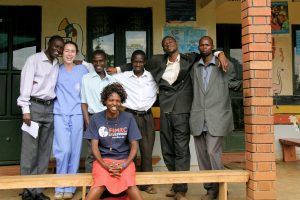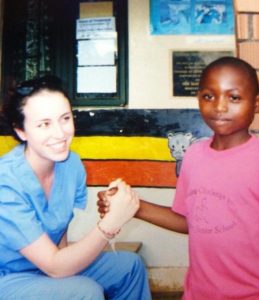Medical voluntourism projects are short-term experiences overseas that combine travel to the under-resourced world with voluntary medical work. Through a variety of sending organizations (such as NGOs, universities, and private companies) medically untrained students travel to regions throughout the global south to set up health education workshops, complete observational work, or even perform basic medical tasks. These volunteers usually participate for short periods, often less than one month. Recruitment for these initiatives and projects frequently takes place online, and participants tend to receive minimal orientation to best practices in the local medical or cultural contexts before their mission to improve the health of served communities. Evidence strongly suggests that involvement with medical voluntourism can lead pre-medical students to complete, or be tempted to conduct, clinical responsibilities that they are not qualified to undertake.
However, pre-medical students’ involvement in clinical tasks points to an inherently problematic paradox. Obtaining a hospital-based volunteer placement in the United States, for example, most often requires a rigorous application process, a police background check and the successful completion of a, or multiple, training course(s) at the bare minimum. Even upon successful completion of this in- depth process, the tasks for which volunteers are permitted to complete do not include even the most basic medical procedures. Further, if a group of untrained and unlicensed foreigners entered a community in the United States and began carrying out medical procedures (free of charge) would likely be arrested and deported.
The ethical issues encompassing the practice of voluntourism and the work of healthcare professionals and medical students abroad have both been examined by global health researchers to significant lengths. However, the ethical implications of pre-medical volunteers abroad have not been critically analyzed or understood. This brief section aims to demonstrate that the use of medically unskilled and uncertified volunteers for clinical tasks in the under-resourced world is problematic. Ultimately, this analysis does not recommend that pre-medical students should evade engagement with global health disparities, or that all volunteer medical initiatives abroad should not involve untrained individuals completing clinical tasks. Rather, it demonstrates the critical importance of actively questioning the ethics of pre-medical student experiences abroad and calls for the creation of comprehensive guidelines or minimal standards aimed to improve how initiatives are carried out and implemented.
The ethical and health implications of having pre-medical volunteers physically managing patients in a clinical setting are complex and subtle with costs and benefits to the patient population. In 2013, at the age of sixteen, I served as a medical volunteer for two weeks with the Foundation for the International Medical Relief of Children (FIMRC) working on their Project Bumwalukani, a health intiative based in the village of Bumwalukani  in Uganda. Not only was this my first experience outside of the country, but it was also my first time in a clinical setting. With the qualifications of CPR and the burning desire to be a doctor, I took part in clinical tasks from recording patient vitals, to observing local physicians, to assisting in the suturing of a mans fingers. It was the color of my skin, my nationality stood and scrubs I had ordered online that served as my qualification. During my time in Uganda, not only was a called “doctor,” but I was asked to give injections and extract teeth. By the end of my two weeks of service, I had “learned” how to and conducted over ten tooth extractions with minimal supervision. Despite my short time in country, I felt that I had gained a new perspective of the world through exposure to this new culture. However, due to my enthusiasm, young age, and the rhetoric preached, I did not know better, nor consider the potentially harmful consequences of my actions.
in Uganda. Not only was this my first experience outside of the country, but it was also my first time in a clinical setting. With the qualifications of CPR and the burning desire to be a doctor, I took part in clinical tasks from recording patient vitals, to observing local physicians, to assisting in the suturing of a mans fingers. It was the color of my skin, my nationality stood and scrubs I had ordered online that served as my qualification. During my time in Uganda, not only was a called “doctor,” but I was asked to give injections and extract teeth. By the end of my two weeks of service, I had “learned” how to and conducted over ten tooth extractions with minimal supervision. Despite my short time in country, I felt that I had gained a new perspective of the world through exposure to this new culture. However, due to my enthusiasm, young age, and the rhetoric preached, I did not know better, nor consider the potentially harmful consequences of my actions.
In dealing with medical ethics, the principles of beneficence and nonmaleficence require healthcare workers to consider both harm and benefit to the patient, and to strive
to produce a net benefit (over harm). However, to effectively provide benefits and understand the relative risks for harm, rigorous and effective education and training is critical. Medically unskilled volunteers do not possess this training, and this can severely compromise their ability to guarantee net benefit over harm in the completion of clinical tasks. Rather than being motivated by concepts of harm and net benefit, pre-medical  volunteer, not unlike other voluntourists, have often been seduced by, and act upon, the rhetoric of “need,” “making a difference,” and “good intentions.” As a result, communities become defined by their health needs and development is subsequently described as a simple process that demands enthusiasm and labor from outside parties. As FIMRC notes regarding service as a volunteer at one of their clinics abroad: “you will be making a difference today that will last long after you leave, through important health initiatives.”
volunteer, not unlike other voluntourists, have often been seduced by, and act upon, the rhetoric of “need,” “making a difference,” and “good intentions.” As a result, communities become defined by their health needs and development is subsequently described as a simple process that demands enthusiasm and labor from outside parties. As FIMRC notes regarding service as a volunteer at one of their clinics abroad: “you will be making a difference today that will last long after you leave, through important health initiatives.”
Considering factors such as the severe and debilitating shortage of health professionals in under-served regions, (like sub-Saharan Africa, where only three percent of the healthcare workers worldwide are situated, but where more than twenty-five percent of the global disease burden is located) well-intentioned volunteers may be overcome by a moral imperative to help. As FIMRC proposes, “with understaffed hospitals serving low-income communities, volunteers receive an unfiltered experience in the healthcare field supporting the over-worked staff, enhancing their efficiency and allowing more people in need to be served.” Volunteers, like me, were (and may be) led to believe that the provision of any medical services, irrespective of training and experience, and lack thereof, of the provider, will “benefit people in poverty.”
Another factor that likely hinders the realistic weighing of benefit and harm by volunteers is the strong enthusiasm and unique opportunity for early exposure to medicine. Si
milarly to medical students, it is possible for pre-medical volunteers to see medical voluntourism trips as an opportunity to perform medical procedures that they would otherwise not be permitted to undertake in their home-developed country, even after six years of formal medical education. Medical voluntourism organizations, who provide early opportunities for volunteers to gain clinical practice simultaneously support volunteers’ enthusiasm for early exposure to medicine. Moreover, my previously-mentioned experience as a high school volunteer [being encouraged to] practicing beyond my scope and skill level suggests that perhaps it is beyond volunteers and medical voluntourism organizations that play a role in supporting volunteers’ inappropriate roles in clinical settings. Whether such enabling and encouragement is in response to the endless burden on certified local healthcare workers and infrastructure, a need for clinical assistance or an overestimation of volunteers’ clinical skill levels remains unclear.
The belief that good intentions are sufficient, combined with volunteers’ enthusiasm for exposure and undefined rules and boundaries, untrained volunteers are likely to accept offers to perform clinical tasks that they are untrained to perform. The literature on global health electives for medical students reveals that these types of ethically problematic clinical situations can harm patients, place volunteers in circumstances that are potentially psychologically damaging and are shockingly prevalent. For example, a mother experiencing peripartum complications during delivery that an unsupervised volunteer is unable to address, that could result in adverse, and potentially life-threatening, consequences for the mother, infant, and even for the volunteer. Further, such encouraging and engaging rhetoric can also influence medical voluntourism organizations, leading to the development and implementation of health initiatives that are not integrated within local health infrastructure and are – in the long term – harmful to communities.
Medical voluntourism initiatives also have the capacity to undermine patient autonomy. The principle of autonomy states that the healthcare provider- patient relationship is to be based on trust. Patients must be advised and included in decisions made concerning their treatment and must not be deceived. Due to the socioeconomic and educational vulnerability of patients in most of the rural, under- resourced world, patients are likely unaware of a volunteer’s educational level and respective credentials. The establishment of such power imbalances in the relationships between volunteers and patients in the under-resourced world may result in volunteers being trusted based on their developed world, global north background and assumed healthcare knowledge. For example, a volunteer dressed in surgical scrubs could likely be interpreted by local populations as a medical professional, as I was. Even if a patient were made aware that a volunteer is practicing beyond their scope of knowledge and training, it is unlikely that the patient will be in a position to demand or access alternative care. Additionally, communities in which medical voluntourists generally operate in commonly suffer from many medical problems and lack options to address them. Moreover, to ensure and preserve the principle of autonomy, those involved in healthcare must be able to communicate well with patients. Thus, patient autonomy in medical voluntourism frameworks can be threatened and exceptionally complicated by volunteers’ lack of cultural competence and inability to communicate in the local language.
(For references, see Research).

